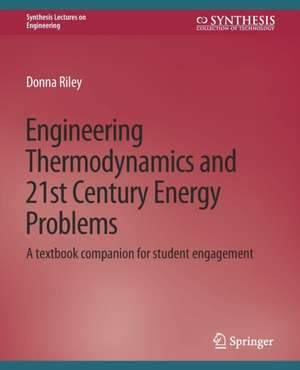Engineering Thermodynamics and 21st Century Energy Problems: A Textbook Companion for Student Engagement: Synthesis Lectures on Engineering, Science, and Technology
Autor Donna Rileyen Limba Engleză Paperback – 28 oct 2011
Din seria Synthesis Lectures on Engineering, Science, and Technology
-
 Preț: 393.52 lei
Preț: 393.52 lei -
 Preț: 395.92 lei
Preț: 395.92 lei -
 Preț: 321.34 lei
Preț: 321.34 lei -
 Preț: 284.04 lei
Preț: 284.04 lei - 15%
 Preț: 500.59 lei
Preț: 500.59 lei -
 Preț: 397.38 lei
Preț: 397.38 lei - 15%
 Preț: 581.14 lei
Preț: 581.14 lei -
 Preț: 387.75 lei
Preț: 387.75 lei -
 Preț: 320.40 lei
Preț: 320.40 lei - 20%
 Preț: 594.83 lei
Preț: 594.83 lei -
 Preț: 384.86 lei
Preț: 384.86 lei - 20%
 Preț: 588.21 lei
Preț: 588.21 lei - 18%
 Preț: 738.28 lei
Preț: 738.28 lei - 15%
 Preț: 644.95 lei
Preț: 644.95 lei -
 Preț: 329.98 lei
Preț: 329.98 lei -
 Preț: 214.57 lei
Preț: 214.57 lei -
 Preț: 236.41 lei
Preț: 236.41 lei - 20%
 Preț: 331.25 lei
Preț: 331.25 lei -
 Preț: 320.40 lei
Preț: 320.40 lei - 15%
 Preț: 527.97 lei
Preț: 527.97 lei -
 Preț: 420.97 lei
Preț: 420.97 lei - 15%
 Preț: 583.61 lei
Preț: 583.61 lei -
 Preț: 352.63 lei
Preț: 352.63 lei - 15%
 Preț: 527.97 lei
Preț: 527.97 lei -
 Preț: 420.02 lei
Preț: 420.02 lei - 15%
 Preț: 526.35 lei
Preț: 526.35 lei -
 Preț: 396.43 lei
Preț: 396.43 lei - 18%
 Preț: 735.07 lei
Preț: 735.07 lei -
 Preț: 270.36 lei
Preț: 270.36 lei -
 Preț: 386.81 lei
Preț: 386.81 lei -
 Preț: 389.70 lei
Preț: 389.70 lei - 20%
 Preț: 295.74 lei
Preț: 295.74 lei - 17%
 Preț: 458.17 lei
Preț: 458.17 lei - 15%
 Preț: 523.91 lei
Preț: 523.91 lei -
 Preț: 514.29 lei
Preț: 514.29 lei -
 Preț: 413.76 lei
Preț: 413.76 lei -
 Preț: 404.13 lei
Preț: 404.13 lei -
 Preț: 427.71 lei
Preț: 427.71 lei -
 Preț: 390.63 lei
Preț: 390.63 lei -
 Preț: 358.76 lei
Preț: 358.76 lei - 15%
 Preț: 640.06 lei
Preț: 640.06 lei -
 Preț: 399.81 lei
Preț: 399.81 lei -
 Preț: 221.18 lei
Preț: 221.18 lei - 15%
 Preț: 531.26 lei
Preț: 531.26 lei - 15%
 Preț: 528.80 lei
Preț: 528.80 lei - 15%
 Preț: 529.60 lei
Preț: 529.60 lei
Preț: 193.78 lei
Nou
Puncte Express: 291
Preț estimativ în valută:
37.08€ • 40.27$ • 31.15£
37.08€ • 40.27$ • 31.15£
Carte tipărită la comandă
Livrare economică 23 aprilie-07 mai
Preluare comenzi: 021 569.72.76
Specificații
ISBN-13: 9783031793417
ISBN-10: 3031793412
Ilustrații: XII, 85 p.
Dimensiuni: 191 x 235 mm
Greutate: 0.19 kg
Editura: Springer International Publishing
Colecția Springer
Seriile Synthesis Lectures on Engineering, Science, and Technology, Synthesis Lectures on Engineering
Locul publicării:Cham, Switzerland
ISBN-10: 3031793412
Ilustrații: XII, 85 p.
Dimensiuni: 191 x 235 mm
Greutate: 0.19 kg
Editura: Springer International Publishing
Colecția Springer
Seriile Synthesis Lectures on Engineering, Science, and Technology, Synthesis Lectures on Engineering
Locul publicării:Cham, Switzerland
Cuprins
What and Why?.- The First Law: Making Theory Relevant.- The Second Law and Property Relations.- Thinking Big Picture about Energy and Sustainability.
Notă biografică
Donna Riley is a founding faculty member and Associate Professor in the Picker Engineering Program at Smith College, where she has been teaching thermodynamics for over 10 years. She received her B.S.E. in Chemical Engineering from Princeton University and a Ph.D. in Engineering and Public Policy from Carnegie Mellon University. Her technical research combines methods in engineering and the social sciences to characterize and communicate chemical risk. She seeks to integrate quantitative modeling of chemical risks (from sources to exposure endpoints) with an understanding of the ways in which human beliefs and behavior influence risk. Past projects have involved characterizing the risks of mercury use as part of religious and folk traditions in Latino and Caribbean communities, and developing improved consumer-product warnings. She is currently collaborating with chemists at Smith and the University of Massachusetts on developing a community-oriented air quality research lab. In 2005 Riley received a CAREER award from the National Science Foundation for implementing pedagogies of liberation, based on the work of Paulo Freire, bell hooks, and others, into engineering education. Aspects of critical pedagogies that are operationalized in Riley's classrooms include connecting course material to student experience, emphasizing students as authorities in the classroom, integrating ethics and policy considerations in the context of social justice, problematizing science as objectivity, and incorporating contributions from women, people of color, and people living in the global South.
